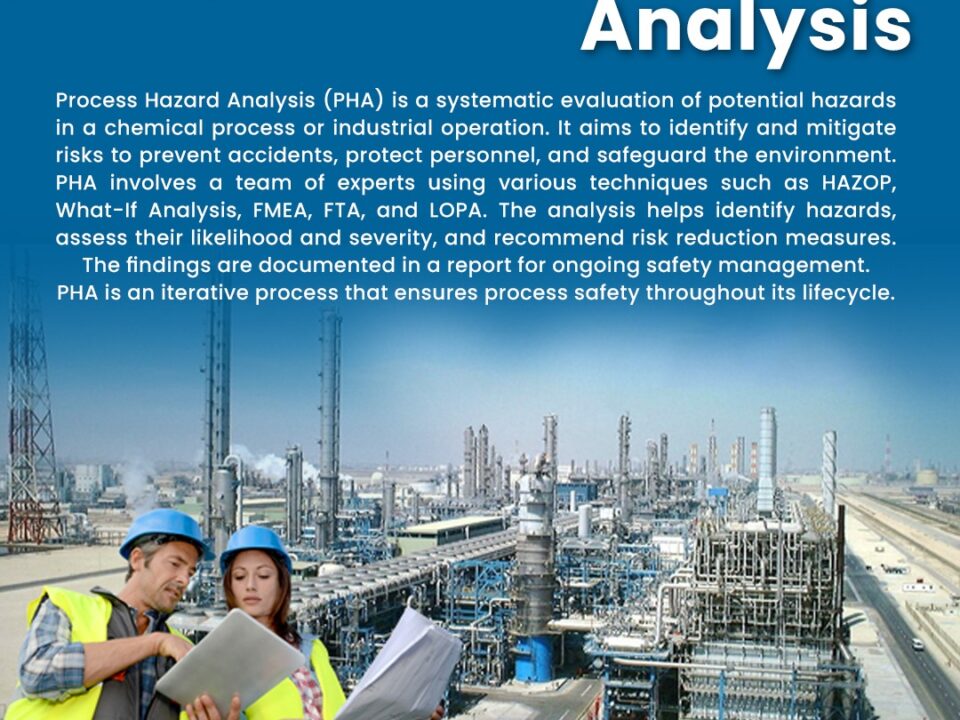Implementing Pre-Startup Safety Reviews: Building a Solid Foundation for Safety Excellence in India’s Process Industries

Understanding the Vital Importance of Fire Adequacy Study and Designing in Manufacturing Industries: A Complete Guide
October 14, 2023
A Cultural Shift towards Safety Excellence: How BBS Implementation Programs Drive Organizational Success
October 16, 2023In this article, we delve into a critical aspect of India’s process industries – Pre-Startup Safety Reviews (PSSRs). Safety should never be compromised, especially when it comes to high-risk operations. We shed light on the necessity of implementing PSSRs and how they can build a solid foundation for safety excellence. By highlighting the problem at hand, we aim to raise awareness and emphasize the significance of this crucial process. So, what can you expect? A comprehensive understanding of PSSRs, their importance, and the promise of safety excellence in India’s process industries. Let’s embark on this journey together towards a safer future.
Understanding Pre-Startup Safety Reviews (PSSRs)
In the realm of industrial safety, comprehending the essence of Pre-Startup Safety Reviews (PSSRs) is paramount. PSSRs are a crucial step in ensuring safety excellence in India’s process industries. By conducting thorough assessments before initiating new operations or modifications, potential hazards can be identified and mitigated effectively. This proactive approach not only safeguards the well-being of workers but also protects the environment and enhances overall operational efficiency. PSSRs involve a meticulous examination of all aspects related to equipment, processes, and procedures before they are commissioned or re-started. It entails a comprehensive evaluation of numerous factors such as design documents, engineering controls, hazard identification, operating procedures, and personnel competence. Through this evaluation process, potential risks can be identified and addressed promptly to create a secure working environment.
Understanding PSSRs not only empowers organizations to adhere to regulatory requirements but also fosters a culture that prioritizes safety at every stage of industrial operations. By valuing the implementation of PSSRs as an integral part of their management systems, organizations demonstrate their steadfast commitment to safeguarding lives and assets while fostering trust among employees and stakeholders alike.
Importance of PSSRs in Ensuring Safety Excellence
Implementing Pre-Startup Safety Reviews (PSSRs) is of paramount importance in ensuring safety excellence within India’s process industries. PSSRs serve as a critical checkpoint before a new or modified process is commissioned, allowing for a comprehensive assessment of potential risks and hazards. By meticulously examining the design, installation, and operational aspects of a facility, PSSRs provide an opportunity to rectify any safety gaps and ensure a robust foundation for operations. PSSRs act as guardians of safety by identifying potential deviations from established safety standards and procedures. They enable organizations to proactively address these deviations prior to starting up the process, minimizing the likelihood of incidents or accidents during operation. This proactive approach not only protects the well-being of employees but also safeguards nearby communities and the environment from potential harm.
Moreover, implementing effective PSSR processes fosters a culture of accountability and responsibility throughout an organization. It encourages employees at all levels to prioritize safety as an integral part of their daily activities. By emphasizing the importance of thorough checks and assessments before commissioning new processes, PSSRs instil a sense of confidence among stakeholders that every effort has been made to ensure their well-being.
In essence, recognizing the significance of PSSRs in ensuring safety excellence reflects an organization’s commitment towards its workforce, community, and environment. It demonstrates proactive risk management practices that lead to enhanced operational efficiency and productivity. By valuing the importance of PSSRs in maintaining safe operations within India’s process industries, organizations can create an environment where workers thrive with confidence while achieving remarkable success through sustainable business practices.
Regulatory Requirements for PSSRs in India
Regulatory Requirements for PSSRs in India: In India, the implementation of Pre-Startup Safety Reviews (PSSRs) is not just a best practice but also a legal requirement mandated by regulatory bodies. The importance of PSSRs in ensuring safety excellence cannot be overstated, and therefore, adherence to these regulations is crucial for process industries operating in the country.
Under the purview of the Factories Act 1948 and the Petroleum Rules 2002, it is mandatory for all process industries in India to conduct PSSRs before starting up any new or modified plant or facility. These regulations aim to prevent accidents and promote a culture of safety by assessing potential hazards and implementing necessary control measures prior to commencing operations.
The regulatory requirements encompass various aspects such as thorough documentation, verification of compliance with safety standards, and involvement of competent individuals in conducting the review. These requirements ensure that all critical elements related to plant design, equipment integrity, emergency response plans, and worker safety are meticulously evaluated before commissioning.
By placing such emphasis on regulatory compliance with regards to PSSRs, India demonstrates its commitment to fostering a safe working environment within its process industries. This proactive approach not only protects human lives but also enhances investor confidence and promotes sustainable growth in these sectors. Ultimately, strict adherence to these regulations establishes a solid foundation for safety excellence throughout India’s process industries.
Key Components of an Effective PSSR Process
Crafting an effective Pre-Startup Safety Review (PSSR) process requires meticulous attention to detail and a comprehensive understanding of potential hazards. Several key components contribute to the success of such a process. Firstly, conducting a thorough Process Hazard Analysis (PHA) is paramount. This entails identifying and evaluating potential risks associated with equipment, chemicals, and operating procedures. By systematically analyzing each aspect of the process, organizations can proactively address safety concerns before initiating operations. Secondly, formalizing PSSR procedures and documentation ensures consistency and clarity throughout the implementation phase. Establishing standardized guidelines for reviewing design specifications, operating procedures, and maintenance protocols guarantees that all stakeholders are on the same page regarding safety requirements. Adequate documentation also allows for effective communication between different departments or teams involved in the PSSR process.
Lastly, training and competency development play a pivotal role in building a solid foundation for safety excellence through PSSRs. Organizations must invest in providing comprehensive training programs to employees involved in implementing PSSRs. By equipping personnel with the necessary knowledge and skills, they can confidently carry out inspections, identify potential hazards, and make informed decisions to mitigate risks effectively.
The key components of an effective PSSR process collectively create a robust framework that bolsters safety excellence within India’s process industries. Adopting these elements ensures smooth operations while prioritizing employee well-being and environmental preservation—an optimistic outcome that fosters confidence in the industry’s commitment to maintaining high standards of safety.
Conducting a Comprehensive Process Hazard Analysis (PHA)
In this crucial stage of implementing Pre-Startup Safety Reviews (PSSRs), conducting a comprehensive Process Hazard Analysis (PHA) is paramount. The PHA aims to identify and evaluate potential hazards associated with the process, ensuring that appropriate safeguards are in place prior to start-up. This meticulous analysis involves a multidisciplinary team of experts, encompassing engineers, operators, maintenance personnel, and safety professionals.
During the PHA, every aspect of the process is scrutinized with meticulous attention to detail. From identifying potential deviations in process parameters to assessing worst-case scenarios, no stone is left unturned. Each hazard is assessed for severity and likelihood, allowing prioritization of risk controls. By engaging diverse perspectives and leveraging collective knowledge, the PHA not only ensures legal compliance but also promotes a proactive safety culture within the organization.
The creative opportunity lies in recognizing that conducting a comprehensive PHA offers more than just risk mitigation—it fosters innovation. By inviting various stakeholders to contribute their insights during this process, companies tap into their unique expertise and generate novel ideas for enhancing safety protocols. This inclusive approach not only bolsters employee engagement but also establishes an optimistic atmosphere centered around continuous improvement and preventative measures. Through effective PHAs, organizations can position themselves as pioneers of safety excellence in India’s dynamic process industries.
Formalizing PSSR Procedures and Documentation
Formalizing PSSR Procedures and Documentation: A crucial aspect of implementing Pre-Startup Safety Reviews (PSSRs) lies in formalizing the procedures and documentation surrounding this process. By establishing clear guidelines, organizations can ensure consistency and uniformity in conducting PSSRs, leading to enhanced safety performance and reduced risk.
The first step in formalizing PSSR procedures is to develop a well-defined checklist that covers all relevant aspects of the review. This checklist should encompass various elements such as equipment installation, safety interlocks, emergency shutdown systems, personnel training, and documentation verification. By meticulously addressing each item on the checklist, companies can ensure comprehensive scrutiny before startup.
Documentation plays a vital role in formalizing PSSR procedures as it serves both as a record of compliance and as a tool for future reference. Maintaining detailed records of PSSR activities enables organizations to track their safety performance over time and identify areas for improvement. Furthermore, documentation allows for effective communication among different stakeholders involved in the startup process, ensuring everyone is on the same page regarding safety protocols.
By establishing robust procedures and maintaining accurate documentation for PSSRs, companies demonstrate their commitment to safety excellence. This meticulous approach not only instils confidence within the organization but also fosters trust among regulators, employees, customers, and other stakeholders. Ultimately, formalizing PSSR procedures strengthens an organization’s foundation for long-term safety success while promoting a culture of accountability and continuous improvement.
Training and Competency Development for PSSR Implementation
Training and Competency Development for PSSR Implementation: In order to effectively implement Pre-Startup Safety Reviews (PSSRs) and build a solid foundation for safety excellence in India’s process industries, a strong emphasis must be placed on training and competency development. It is imperative that all personnel involved in the PSSR process receive comprehensive training to ensure their understanding of the procedures, methodologies, and regulatory requirements.
Training sessions should cover various aspects such as conducting thorough equipment inspections, identifying potential hazards, evaluating risk levels, and implementing appropriate control measures. Additionally, it is crucial to provide training on effective communication and collaboration skills to foster a culture of open dialogue among team members during the PSSR process.
Competency development goes beyond theoretical knowledge; it involves practical application of acquired skills. Simulated scenarios and hands-on exercises can help individuals gain confidence in their abilities to execute PSSRs effectively. Additionally, continuous learning opportunities through workshops, webinars, or industry conferences will keep professionals up-to-date with evolving best practices.
Ultimately, investing in comprehensive training programs and fostering competency development instils a sense of empowerment among personnel involved in PSSR implementation. This translates into increased efficiency, reduced incidents or accidents during start-up operations, and ultimately sets the stage for safety excellence across India’s process industries.
Integrating PSSRs with Other Safety Management Systems
Integrating PSSRs with Other Safety Management Systems: In order to establish a robust safety culture within India’s process industries, it is crucial to integrate Pre-Startup Safety Reviews (PSSRs) with other safety management systems. By doing so, organizations can achieve a harmonized approach towards safety that not only improves overall operational efficiency but also enhances the well-being of workers.
One effective way to integrate PSSRs with other safety management systems is by aligning them with the Process Safety Management (PSM) framework. This framework provides a systematic approach for identifying, assessing, and mitigating risks associated with hazardous processes. By incorporating PSSRs as a key element of PSM, companies can ensure that critical safety checks are conducted prior to startup, thereby minimizing the likelihood of accidents or incidents.
Furthermore, integrating PSSRs with other elements of the safety management system, such as hazard communication programs and emergency response plans, fosters a comprehensive approach towards risk mitigation. This connectivity allows for seamless information flow between different safety components and enables organizations to respond swiftly and effectively in case of any unforeseen events. By embracing this holistic integration, India’s process industries can build a solid foundation for safety excellence that permeates throughout their operations and promotes a culture where employee welfare takes precedence.
Challenges and Solutions in Implementing PSSRs in India
Challenges and Solutions in Implementing PSSRs in India: Navigating the complex landscape of implementing Pre-Startup Safety Reviews (PSSRs) in India’s process industries poses unique challenges. One major hurdle relates to the diverse regulatory frameworks present across different states, making it crucial to establish a standardized approach that ensures compliance while accounting for regional variations. Additionally, the scarcity of trained professionals well-versed in PSSR guidelines can impede successful implementation.
However, amidst these challenges lie promising solutions. Collaboration between government agencies, industry stakeholders, and academia can facilitate the development of comprehensive training programs on PSSR implementation, enhancing competency within the sector. Furthermore, establishing industry-wide forums for knowledge-sharing and best practices can provide a platform for companies to learn from each other’s experiences and collectively improve safety outcomes.
By addressing these challenges head-on through proactive measures and fostering a culture of safety consciousness, India’s process industries have an opportunity to excel in implementing PSSRs and ensure the highest level of safety across their operations. Through such concerted efforts, organizations can establish themselves as leaders in safety excellence while safeguarding their workforce and surrounding communities.
Case Studies of Successful PSSR Implementation in India’s Process Industries
The successful implementation of Pre-Startup Safety Reviews (PSSRs) in India’s process industries can be witnessed through inspiring case studies that showcase the commitment towards safety excellence. In one notable example, a leading petrochemical company based in Gujarat demonstrated their dedication to PSSR implementation by investing in state-of-the-art technology and rigorous training programs. By actively involving all stakeholders, from top management to front-line workers, they created a culture of safety that permeated every aspect of their operations. Another remarkable instance involves a pharmaceutical manufacturing facility in Maharashtra. Recognizing the criticality of PSSRs in ensuring product quality and employee safety, they established multidisciplinary teams to conduct thorough reviews before commissioning new processes or equipment. Through meticulous documentation and continuous improvement initiatives, they were able to identify potential hazards early on and implement effective control measures, resulting in enhanced process reliability and reduced risks.
These case studies highlight the transformative impact of successful PSSR implementation on India’s process industries. By prioritizing safety at every stage and fostering collaboration among different departments, organizations are not only safeguarding lives but also unlocking opportunities for sustainable growth and improved reputation within the industry. These success stories serve as a beacon of optimism for other companies seeking to build a solid foundation for safety excellence through PSSRs.
Continuous Improvement and Periodic Review of PSSR Processes
Continuous Improvement and Periodic Review of PSSR Processes: Sustaining a culture of safety and ensuring ongoing excellence in pre-startup safety reviews (PSSRs) require a commitment to continuous improvement and periodic review. While successfully implementing PSSR procedures is an important milestone, it is equally crucial to monitor, evaluate, and refine these processes over time. By doing so, organizations can adapt to changing technologies, regulations, and best practices while fostering a proactive approach towards safety.
One key aspect of continuous improvement is the regular assessment of PSSR effectiveness through data analysis and feedback mechanisms. This involves analyzing incident reports, near-miss events, and any deviations from established procedures occurring after startup. By systematically reviewing these findings, organizations can identify potential gaps or areas for enhancement within their PSSR processes. Moreover, fostering an open reporting culture encourages employees to share their insights and suggestions for improvement.
Periodic review sessions also provide the valuable opportunity for knowledge sharing among different stakeholders involved in the PSSR process. Such collaborative discussions allow for the identification of emerging trends or patterns that could inform updates to existing procedures or the development of new guidelines. Furthermore, conducting comprehensive audits periodically helps ensure compliance with regulatory requirements while maintaining a high standard of safety performance.
Embracing a mindset of continuous improvement in PSSR implementation ultimately fosters an environment where innovation thrives alongside safety excellence. Organizations that prioritize ongoing evaluation and enhancement are better positioned to anticipate potential risks and mitigate them effectively before they escalate into major incidents. By continuously refining their PSSR processes through learning from past experiences, organizations can inspire confidence in their commitment to workplace safety while achieving sustainable success in India’s process industries
Conclusion
In the grand tapestry of India’s process industries, the successful implementation of Pre-Startup Safety Reviews (PSSRs) stands as a beacon of hope and progress. It is through these meticulous examinations that we lay the groundwork for a safer and more secure future. As we witness the convergence of regulatory requirements, comprehensive process hazard analyses, and robust documentation procedures, the path towards safety excellence becomes clearer than ever before. Let us embrace this opportunity with unwavering determination, knowing that each PSSR is a stepping stone towards an industry landscape adorned with impenetrable layers of protection. Together, we can forge a future where accidents are but distant memories and safety shines brilliantly in every corner of our beloved nation




